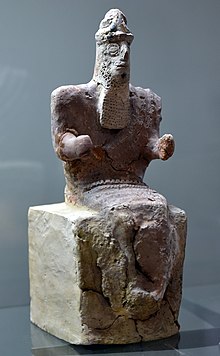Lament for Nippur

The Lament for Nippur, or the Lament for Nibru, is a Sumerian lament, also known by its incipit tur3 me nun-e ("After the cattle pen...").[2] It is dated to the Old Babylonian Empire (c. 1900–1600 BCE).[3] It is preserved in Penn Museum on tablet CBS13856.[4]
It is one of five known Mesopotamian "city laments"—dirges for ruined cities in the voice of the city's tutelary goddess.[5]


Text
[edit]The Lament is composed of 9 kirugu (sections, songs) and 8 gišgigal (antiphons) followed by 3 more kirugu.
Numbered by kirugu, the lament is structured as follows:
- storm of Enlil; Enlil destroys Nippur
- weeping goddess; Nippur addresses Enlil
- storm of Enlil; Enlil destroys Nippur
- weeping goddess; the poet addresses Nippur
- storm of Enlil; Ishme-Dagan recreates Nippur
- weeping goddess; the poet addresses Nippur
- storm of Enlil; Ishme-Dagan recreates Nippur
- storm of Enlil; Enlil recreates Nippur
- storm of Enlil; Ishme-Dagan recreates Nippur
- storm of Enlil; Enlil recreates Nippur
- storm of Enlil; Ishme-Dagan recreates Nippur
- storm of Enlil; Enlil recreates Nippur[6]
It includes passages in the emesal, a sociolect used by high-status women, showing the importance of women's voices in city laments; emesal is also found in the Lament for Ur.[7]
See also
[edit]- The Lament for Sumer and Ur
- The Lament for Ur
- The Lament for Eridu
- The Lament for Uruk
References
[edit]- ^ "Lamentation for Nippur". www.gatewaystobabylon.com.
- ^ Jacobs, John (January 1, 2016). "The city lament genre in the ancient Near East (in The fall of cities in the Mediterranean: Commemoration in literature, folk-song, and liturgy, ed. Mary Bachvarova, Dorota Dutsch, and Ann Suter, Cambridge and New York: Cambridge University Press, 2016, pp. 13–35)" – via www.academia.edu.
{{cite journal}}: Cite journal requires|journal=(help) - ^ "CDLI-Archival View". cdli.ucla.edu.
- ^ "Tablet - CBS13856 | Collections - Penn Museum". www.penn.museum.
- ^ Hirsch, Edward (April 4, 2017). The Essential Poet's Glossary. Houghton Mifflin Harcourt. ISBN 9780544932098 – via Google Books.
- ^ Jacobs, John (September 20, 2016). Suter, Ann; Dutsch, Dorota; Bachvarova, Mary R. (eds.). The Fall of Cities in the Mediterranean: Commemoration in Literature, Folk-Song, and Liturgy. Cambridge University Press. pp. 13–35.
- ^ Boyadjian, Tamar M. (December 15, 2018). The City Lament: Jerusalem across the Medieval Mediterranean. Cornell University Press. ISBN 9781501730863 – via Google Books.


 French
French Deutsch
Deutsch